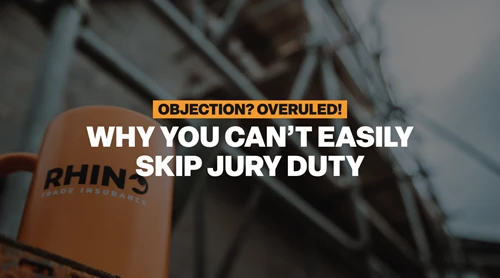Setting up your own Plumbing company can be the most exciting and daunting time of your career. Where do you start? What needs to be done? How do you know if you have covered all bases? Don't worry; the team at Rhino has you covered.
Today, we'll explore the various benefits of setting up a new business and how you go about it. Plumbing is a highly skilled and demanding job where the clamour for work is actually outstripping the supply. Is now the right time to build your empire and employ a team of specialists yourself? Let's discuss.
How to start a Plumbing business
As an experienced Plumber, you will know better than anybody the type of work involved in your day-to-day projects. Simply put, no two days are alike - you could be in a customer's home one day and then at a commercial office block the next. You could be called out in the middle of the night to an emergency or work every hour the weekend sends. That impression you leave on a customer's face is what makes it all worth it - thank god for those warm homes and hot water.
Plumbers will handle various tasks that include:
- Pipework, heating systems and new technologies
- Repairing boilers, toilets and sinks.
- Fitting bathrooms and kitchens
- Installing boilers and air conditioning
After serving your apprenticeship, you will have honed your skillset and have the relevant industry qualifications. To start a plumbing business, you will most likely have a few years of experience with a time-served tradesperson and have studied for either a Level 2 or 3 Diploma in Plumbing and Heating. So now's the time to set up your brand new business. First, you need the following:
When setting up shop, don't just dive in head first without any idea of your goals or how you aim to get there. Every business must start with a business plan. This will outline your entire philosophy, what you are doing, how you will do it, how you aim to fund your venture and more.
Writing a good business plan takes time and effort. And will include various details like:
- What objectives do you have in the short, medium and longer-term
- How your company will stand out and why customers will use your services
- What issues can you envisage, and how can you alleviate them
- What type of qualifications, regulations and insurance will you hold
If you start your business without a business plan, things can soon escalate and become unmanageable. This often happens with tradespeople who want to get started and run before they can walk. In the long run, a solid business plan will help you slowly and steadily grow your business and keep you on the right track.
Learn more from our in-depth blog post on writing a business plan for your trade business.
- Consider your legal requirements.
After a business plan comes the setup of your official company, this will include various legal considerations that you will need to think about.
First off, you will need to decide on the structure. This can include setting up as a Sole Trader, Limited Company, Partnership or Limited Liability Partnership. There are several reasons for and against which one you decide to set up, and it all depends on your situation and where you see your business going in the future. Our team has written a straightforward guide on what each business structure means so that you can decide which is right for you.
On top of your trade business structure, you must register with HMRC or Companies House for tax reasons. If you don't, you could find yourself legally and financially in a world of trouble. You will also need to be aware of your health and safety commitments, especially as a business operating in the trade industry.
Finally, you may want to consider joining a relevant trade association to get help with setting up and maintaining your business. This will also assist you with updates on new regulations and legislation in your industry and add an element of professionalism to your branding.
- Take out the correct level of insurance.
When starting a plumbing business, your insurance is paramount to your company's operations; without it, you risk your livelihood and your reputation as a trustworthy tradesperson. In the trade industry, risk is only a stone's throw away, so being insured will protect you and your assets if that fateful day occurs and you need to claim on your insurance.
At Rhino Trade Insurance, our expert team have spent time and effort concocting the best possible coverage options that can all be moulded to your Plumbing business needs. You can build an entire policy suite to cover every angle of risk in your company:
- Public Liability Insurance: This protects against any damages to property, injury to clients or public members and even accidental death.
- Tool Insurance: This offers cover for your most important devices, which are vital to get your job done.
- Personal Accident Insurance: This offers protection for when you are laid up due to an accident, injury or illness and need to manage your cash flow
- Employers' Liability Insurance: If you have staff members who get ill or injured on a job whilst working for you, your business is protected.
We also offer various other beneficial insurance policies for Plumbing businesses, such as Professional Indemnity Insurance, Legal Cover, Tax Protection and much more.
Other areas you need to take care of when setting up
Consider your rates and choose how much to work.
Tradesmen and women setting up a new business don't always consider their work-life balance. Some hold the mantra of 'make hay whilst the sun shines'. In the early days, it might be best to set official work hours for yourself and stick to them so you can avoid burnout and causing friction in your personal life. Everyone loves to make money; don't forget about the finer things in life and spending time away from your work.
Find out more from our article on time planning for your trade business here.
On top, set the correct going rate for your trade. As a Plumber, you can expect to make a pretty penny for your work as it's super-specialised. When starting, don't undersell yourself and cut your costs. Every job must cover the costs of running your business, wages, tax responsibilities and other external costs. You could find out the going rate in your area so that you don't set your rates too low or high.
Marketing and advertising strategies to attract clients
Marketing online and in public is essential to get your name out there. First off, consider purchasing a work van and creating a unique and eye-catching brand name or logo. Then you can have a vinyl sticker wrapped around your van so that everyone in your local vicinity will be able to spot you. Remember, less is more, so don't load your van with too many details and ensure the main points (like your name and phone number) are clear.
On top, you might consider setting up social media accounts and a website for your business. Social media (such as Instagram, YouTube and TikTok) can help showcase your work on-site and share small videos of who you are so that customers get a feel for your personality and whether you seem 'trustworthy'. You could also build a website to build your reputation, offer customers a place to go to check out your services and add a layer of professionalism on top of all your other marketing.
Final points
To round off this article, you could consider joining a relevant trade body to stay up to date with all the industry trends, news and regulations from like-minded professionals. This and building a local and national community of support from other tradespeople via your social media is a great idea too. We see many Plumbers sharing information, jobs and ideas online with their respective communities.
Why choose Rhino Trade Insurance?
Whether you are just setting up your own Plumbing business or have years of experience and manage a team of professionals, you need to hold the correct level of insurance. Rhino Trade Insurance has protected thousands of tradespeople in the UK for many years and can build bespoke policies for almost every trade business.
Wondering what your next steps are? Call our expert team for more information on 0116 243 7904, or simply head over to the Rhino website and get your business a quote via our quick and easy online shop.




